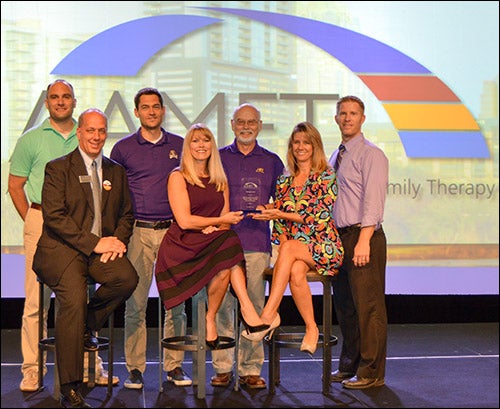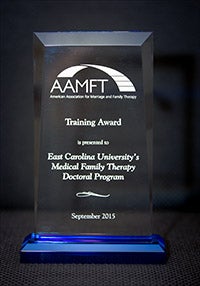TEN YEARS OUT
ECU’s integrated approach to medical family therapy proving successful
Ten years after enrolling its first doctoral class, East Carolina University’s medical family therapy doctoral program is providing its graduates with 100 percent job placement.
More than 60 percent of the program’s graduates are employed as faculty in universities with family therapy and medical family therapy programs or medical schools. Others work in research, policy or administrative roles.
“Our students are sought after while enrolled in the program and after graduation for their research, policy, teaching and clinical skill sets,” said Dr. Jennifer Hodgson, director of the program. Hodgson created the program with Dr. Angela Lamson, professor and associate dean of the College of Health and Human Performance.
An Integrated Approach
A unique skill ECU graduates possess is experience in integrated behavioral health care, which focuses on care for a patient’s mind, body and family. Integrated behavioral health providers work side-by-side with medical health care teams to assess, diagnose and treat patients and their families. This approach has demonstrated better health outcomes for patients, more efficient use of resources and increased patient satisfaction.

During an awards presentation at the American Association for Marriage and Family Therapy conference, ECU faculty are shown with, front row left, Chris Habben, president-elect of AAMFT. Faculty include, front row center, Angela Lamson and front row right, Jennifer Hodgson; back row left to right, Damon Rappleyea, Jake Jensen, Mel Markowski and Andy Brimhall. Not pictured are David Dosser, Kit Didericksen and Lisa Tyndall. (Contributed photo)
“We don’t want people to think about their health in silos—meaning that you go to a medical setting for your physical pain or illness and you go somewhere else for your mental health care,” said Lamson.
Many medical family therapy students gain clinical experience through graduate assistantships with Greene County Health Care, where they provide integrated care and conduct clinical research.
When patients arrive for their medical visit, instead of just stepping on the scale or slipping on a blood pressure cuff, they also receive a baseline screening for depression, anxiety and substance use. If the screening indicates the need for behavioral health care, patients receive treatment; this allows delivery of an intervention that keeps behavioral health from escalating and undermining a patient’s physical health.
“We are helping to shape the future of health care so that all individuals, couples and families can receive their physical, psychological, social and spiritual health care grounded in the best research,” Lamson said.
Building Careers
Dr. Patrick Meadors, manager of psychosocial oncology at Levine Cancer Institute in Carolinas HealthCare System in Charlotte, was among three students in the program’s first graduating class in 2008. “My education provided the foundational structure to build my career within health care,” he said.
“The medical family therapy program and ECU are a significant part of my professional identity.”
Doctoral student Francisco Limon of Mexico said he chose ECU’s program because of its focus and the opportunity to work with underserved populations.
“I liked the focus of the program on a more holistic view of health and wellbeing,” Limon said. “I saw the potential of working with the migrant farmworker community in this area.”
Limon is completing an internship as coordinator of Integrated Care Compliance and Quality Improvement through Greene County Health Care and will continue as a full-time employee after he graduates in May.
Leading Health Care Innovation
Hodgson also serves as a clinical professor in the Department of Family Medicine in the Brody School of Medicine, where she helps cross train behavioral health professionals and physicians to implement integrated behavioral health care.
“The program’s innovative approach to maximizing students’ success, serving the public and leading regional transformation is from a whole health perspective,” Hodgson said. “As patient complexity levels increase and funding resources for health care decrease, the need for this leading science and clinical advancement in health care expands.”
Dr. Suzanne Lazorick, associate professor of pediatrics and public health at the Brody School of Medicine, began partnering with the program eight years ago.

ECU’s medical family therapy doctoral program was honored with the 2015 Training Award, pictured above, from the American Association for Marriage and Family Therapy.
“Our collaboration bridges the fields of medicine, mental health and family therapy.” Lazorick said. “We are on the cutting edge of a new model of patient-centered care where we think of the patient as a whole by addressing medical and psychosocial issues side-by-side. Medical family therapy is representative of this innovation in care.”
Gaining Recognition
The program’s faculty members have helped secure more than $3 million in external funding since the program began. They have offered more than 100 graduate assistantships.
ECU’s program was the first of its kind in the nation and is one of two medical family therapy programs accredited by the Commission on Accreditation for Marriage and Family Therapy Education. It is housed in the Department of Human Development and Family Science in the College of Health and Human Performance.
The program has received state and national recognition, including the 2015 Distinguished Service to Families Award, presented in July at the North Carolina Association for Marriage and Family Therapy annual conference.
On Sept. 5, the American Association for Marriage and Family Therapy (AAMFT) presented ECU’s program with the 2015 Training Award, which recognized their training model as well as significant contributions for advancing the medical family therapy field. “The medical family therapy angle is so new that few have really developed it,” said AAMFT executive director Tracy Todd.
“I applaud ECU for how well it embraced and advanced the specialization,” Todd added.